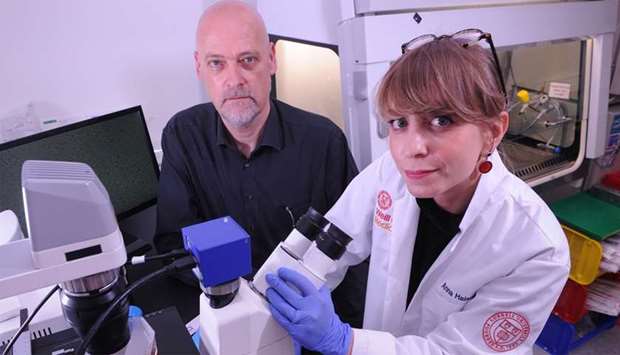Researchers at Weill Cornell Medicine-Qatar (WCM-Q) have devised a new way of testing cancer treatments to reveal how some tumors are able to resist chemotherapy drugs and continue to spread.
Led by Dr. Anna Halama, Assistant Professor of Research in Physiology & Biophysics, the WCM-Q team combined two innovative research techniques to create a new testing platform that not only gives deeper insights into the ways in which certain types of cancers resist chemotherapy drugs and proliferate, but also delivers significant cost and time savings over existing research methods.
Dr. Halama said: “The resistance of tumors to chemotherapy is a major obstacle in fighting cancer, and the underling mechanisms are not fully understood. In some cases, cancer cells switch the way they generate the energy and building blocks they need to grow to evade drug treatment and to further proliferate. To understand and counter these processes, experimental models that accurately reflect the tumor as an entity are needed, but their availability can be a major challenge. For example, cancer cells simply cultured in a Petri dish lack a realistic tumor microenvironment, whereas human tumors grown in mice have severe time and cost constraints”.
Dr. Halama’s team combined the already established laboratory technique of implanting cancerous cells into chicken embryos (called in ovo research) with a powerful biochemical analysis method called metabolomics. After implanting treatment-resistant breast cancer cells into the embryos, the researchers then treated them with doxorubicin, a potent anti-cancer chemotherapy drug. As predicted, tumor growth was reduced, but a portion of the cells continued to proliferate further. By analysing these tumors using metabolomics techniques, the researchers were able to draw a detailed map of the biochemical processes that allowed the cancer cells to evade the chemotherapy.
The research is considered such a significant breakthrough that it was featured on the front cover of Metabolites, one of the industry’s leading scientific journals. The in ovo technique also has the advantage of costing less and being faster than using mice, while at the same time being much more reliable than simpler cell culture techniques.
Dr. Halama said: “We are very pleased with the results of the research as the new testing platform we proposed allows us to analyze in great detail the alternative metabolic pathways that the cancer cells use to escape treatment. It is cost-effective and relatively fast, so we can do more testing in a shorter space of time. It is important to note that these techniques are still at the research stage and are being used for testing both existing and novel cancer therapies in general, but long-term they also have the potential to help conceive personalized treatment options to adapt chemotherapy to individual patients.”
The study, titled Metabolic Signatures of Tumor Responses to Doxorubicin Elucidated by Metabolic Profiling in Ovo, drew upon WCM-Q’s advanced capacity for metabolomic analysis established within the WCM-Q Biomedical Research Program in recent years by Dr. Karsten Suhre, Professor of Physiology & Biophysics and Director of the WCM-Q Bioinformatics Core.
The research was conducted in collaboration Hamad Medical Corporation, the Max Planck Institute for Heart and Lung Research in Bad Nauheim, Germany, and Inovotion, a biomedical research institute in France. The team at WCM-Q now aims to team up with peers at Hamad Medical Corporation once again, this time to conduct clinical research projects to enable the new testing strategy to benefit cancer patients.
The research was supported by the Biomedical Research Program at WCM-Q, a Qatar Foundation partner university. The study was also supported by Qatar National Research Fund grants NPRP12S-0205-190042 and NPRP8-061-3-011.

